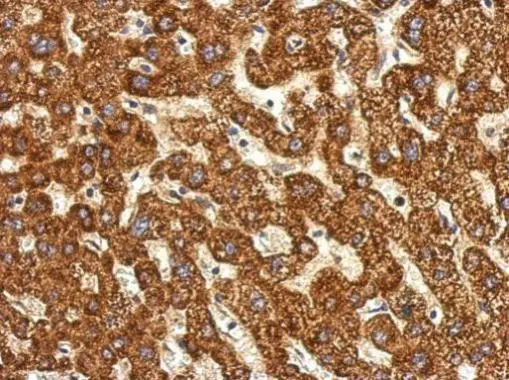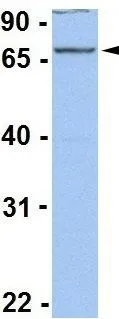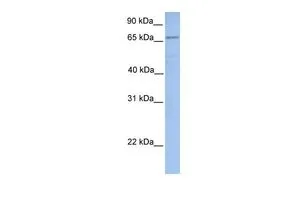
WB analysis of MCF-7 cells using GTX47781 ACSL1 antibody at 0.2-1μg/ml.
ACSL1 antibody, N-term
GTX47781
ApplicationsImmunoFluorescence, Western Blot, ImmunoCytoChemistry
Product group Antibodies
ReactivityHuman
TargetACSL1
Overview
- SupplierGeneTex
- Product NameACSL1 antibody, N-term
- Delivery Days Customer9
- Application Supplier NoteWB: 0.2-2.5 ug/ml. *Optimal dilutions/concentrations should be determined by the researcher.Not tested in other applications.
- ApplicationsImmunoFluorescence, Western Blot, ImmunoCytoChemistry
- CertificationResearch Use Only
- ClonalityPolyclonal
- Concentration0.5-1 mg/ml
- ConjugateUnconjugated
- Gene ID2180
- Target nameACSL1
- Target descriptionacyl-CoA synthetase long chain family member 1
- Target synonymsACS1, FACL1, FACL2, LACS, LACS1, LACS2, long-chain-fatty-acid--CoA ligase 1, LACS 1, LACS 2, acyl-CoA synthetase 1, arachidonate--CoA ligase, fatty-acid-Coenzyme A ligase, long-chain 1, fatty-acid-Coenzyme A ligase, long-chain 2, lignoceroyl-CoA synthase, long-chain acyl-CoA synthetase 1, long-chain acyl-CoA synthetase 2, long-chain fatty acid-CoA ligase 2, long-chain fatty-acid-coenzyme A ligase 1, palmitoyl-CoA ligase 1, palmitoyl-CoA ligase 2, paltimoyl-CoA ligase 1, phytanate--CoA ligase
- HostRabbit
- IsotypeIgG
- Protein IDP33121
- Protein NameLong-chain-fatty-acid--CoA ligase 1
- Scientific DescriptionThe protein encoded by this gene is an isozyme of the long-chain fatty-acid-coenzyme A ligase family. Although differing in substrate specificity, subcellular localization, and tissue distribution, all isozymes of this family convert free long-chain fatty acids into fatty acyl-CoA esters, and thereby play a key role in lipid biosynthesis and fatty acid degradation. Several transcript variants encoding different isoforms have been found for this gene. [provided by RefSeq, Nov 2013]
- ReactivityHuman
- Storage Instruction-20°C or -80°C,2°C to 8°C
- UNSPSC41116161

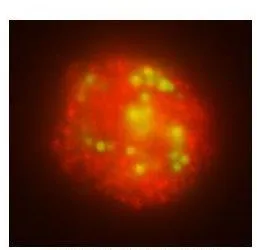
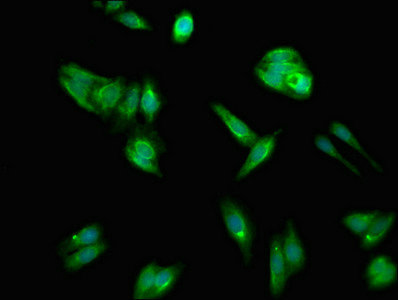
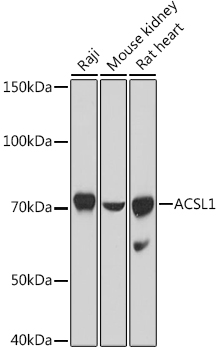


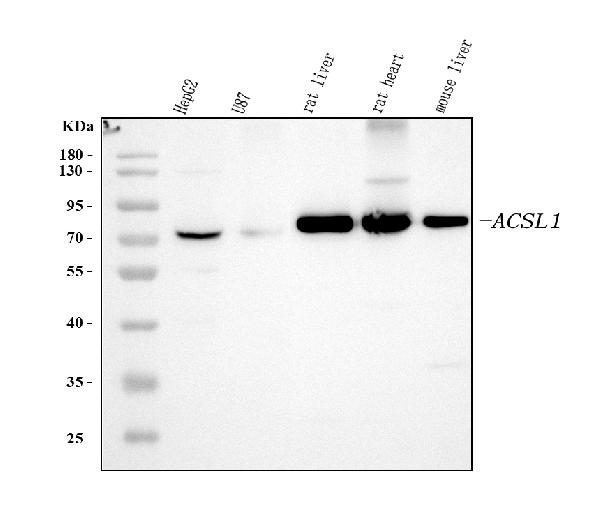
![Various whole cell extracts (30 μg) were separated by 7.5% SDS-PAGE, and the membrane was blotted with ACSL1 antibody [HL1530] (GTX637003) diluted at 1:2000. The HRP-conjugated anti-rabbit IgG antibody (GTX213110-01) was used to detect the primary antibody. Corresponding RNA expression data for the same cell lines are based on Human Protein Atlas program.](https://www.genetex.com/upload/website/prouct_img/normal/GTX637003/GTX637003_44746_20220722_WB_TPM_watermark_22072519_305.webp)
![Non-transfected (–) and transfected (+) HeLa whole cell extracts (30 μg) were separated by 7.5% SDS-PAGE, and the membrane was blotted with ACSL1 antibody [HL1651] (GTX637232) diluted at 1:1000. The HRP-conjugated anti-rabbit IgG antibody (GTX213110-01) was used to detect the primary antibody.](https://www.genetex.com/upload/website/prouct_img/normal/GTX637232/GTX637232_T-44746_20231027_WB_shRNA_watermark_23103019_561.webp)
